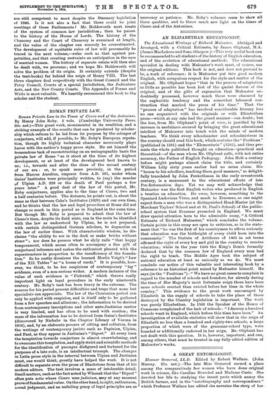The Educational Writings of Richard Mulcaster. Abridged and Arranged, with
a Critical Estimate, by James Oliphant, M.A. (James MacLehose and Sons, Glasgow.)—This very useful book can be recommended to all students of the history of English education, and of the evolution of educational methods. The educational specialist in dealing with Mulcaster's work must, of course, use the original editions. This book is not, and does not pretend to be, a work of reference: it is Mulcaster put into good modern English, with scrupulous respect for tho style and matter of the original. Mr. Oliphant hopes "that in the process of adaptation as little as possible has been lost of the quaint flavour of the original, and of the gifts of expression that Mulcaster un- doubtedly possessed, however much these were obscured by the euphuistic tendency and the somewhat laboured con- struction that marked the prose of his time." That the "process of adaptation" has involved considerable literary loss no one acquainted with the originals or with Elizabethan prose—which at any rate had the grand manner—can doubt; but the loss, from Mr. Oliphant's point of view, is justified by the increase in usefulness secured by bringing the great educational intellect of Mulcaster into touch with the minds of modern teachers. We think every schoolmaster and schoolmistress in the country should read this book, which contains the" Positions" (published in 1581) and the "Elementarie" (1582), and thus pre- sents the whole published thought on education—practical and theoretical—of the man whom Mr. Oliphant calls, with not entire accuracy, the Father of English Pedagogy. John Holt a century before might perhaps almost claim the title, and certainly William Lilly sixty years earlier had no mean claim. His "lesson to his schollers, teaching them good manners," so delight- fully translated by John Penkethman in the early seventeenth century, is a monument to the educational efforts of late Pre-Reformation days. Yet we may well acknowledge that Mulcaster was the first English writer who produced in English a treatise on education. He owes, however, something to the Spaniard Ludovicus Vives, and much to Erasmus, as one might expect from a man who was a distinguished Head-Master (at the Merchant Taylors' School and at St. Paul's School) of the public- school system that Erasmus promoted in England. We must draw special attention here to the admirable essay, "A Critical Estimate of Richard Mulcaster," which concludes the volume. Certain points in this essay are open to criticism, as in the state- ment that "ho was the first of his countrymen to affirm seriously that education was the birthright of every child born into the community." The Statute of Artificers of 1406 in set terms affirmed the right of every boy and girl in the country to receive education; while in the year 1410 the King's Bench formally declared that by the common law of England every man had the right to teach. The Middle Ages took the subject of national education at least as seriously as we do. We must conclude our notice of this valuable and interesting book by a reference to an historical point raised by Mulcaster himself. He says (in the " Positions ") : "We have no great cause to complain in regard to the number of schools and founders, for already during the time of Her Majesty's most fortunate reign there have been more schools erected than existed before her time in the whole country." This evidence to the great work encouraged by Elizabeth in the supply of schools to take the place of those destroyed by the Chantry legislation is important. The work was purely Elizabethan. In 1563 the Speaker of the House of Commons complained of the lack of schools : "I daresay a hundred schools want in England, which before this time have been." An investigation of available statistics will show that in the reign of Elizabeth no less than a hundred and eighty-two schools, a large proportion of which were of the grammar-school type, were founded or additionally endowed in her reign. Mr. Oliphant has not dealt with this question. It is, however, important, and one, among others, that must be treated in any fully edited edition of Mulcaster's works.
A GREAT ENTOMOLOGIST.


























































 Previous page
Previous page